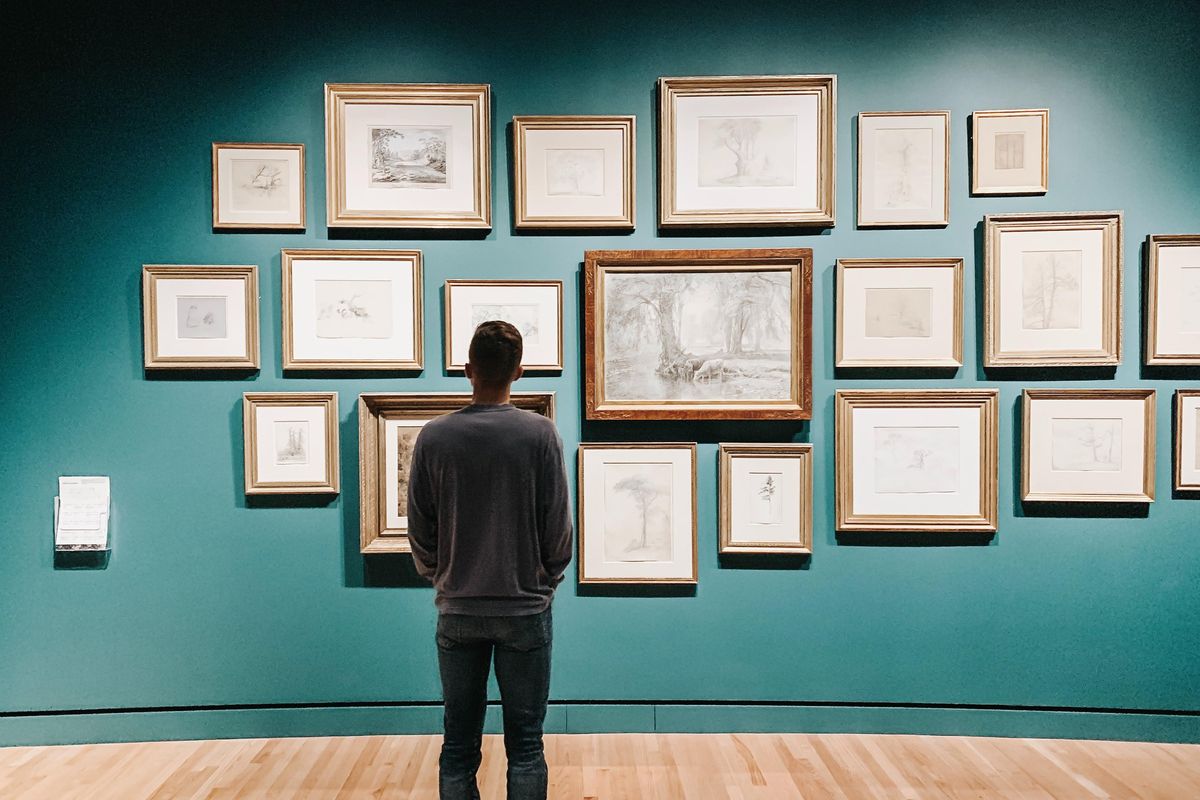The security guards at the Baltimore Museum of Art created their own exhibition
"Public art is for everyone.”

Baltimore Museum of Art's new exhibit was curated by the security officers.
Seventeen security officers at Baltimore Museum of Art now have the added title of "guest curators" for an inclusive (rather than exclusive) new exhibit called “Guarding The Art.”
It was a full-scale hands-on project: The security team worked with professional art historian and curator Dr. Lowery Stokes Sims to not only research and select pieces, but to weigh in on nearly every aspect of the exhibit, from installation details to scheduling tours. And each participant received compensation for their time in addition to the creative opportunity.
The collection was intentionally designed to be eclectic and personal. No genre, style or medium was off limits (works range from a sixth century pre-Columbian sculpture to a protest collage made in 2021) and the officers all brought other unique aspects of their lives into the mix, such as being a published poet, bartender, dog walker, chef, philosophy major and, yes, even a painter, to name a few wonderful examples. We aren’t just our day jobs, after all.
The guards’ more personal approach helped breathe new life into art appreciation. Dr. Sims told NPR, "I was so energized and enthused to hear these extraordinary reactions to art. It was so beyond the art-speak that I'm used to. It was fresh, immediate, and perceptive."

"Evening Glow" by Alma W. Thomas made the "Guarding The Art" list, according to CBS News.
When you think about it, it makes perfect sense. Museum security guards spend upwards of eight hours a day, multiple days a week, next to the pieces we tend to walk by after about 20 seconds. Who better to curate the art than those who spend the most time with it?
And yet, these workers are often treated as unapproachable, invisible fixtures of the museum itself. Certainly not fellow humans.
"I think some visitors just don't even know we exist, to be honest," security team member Chris Koo told CBS News. "A lot of us hope that more visitors will ask us and have conversations with us about the art, rather than asking us where the bathroom is. We are kinda shadows of the museum."

Koo chose the visually bold works of Mark Rothko. Example above.
Asma Naeem, the museum's head curator, told CNN/CBS, "It’s a simple idea, but it's asking some very profound questions about who is art for? Who are museums for? Who gets to talk about the arts? Who holds the knowledge? Are there other kinds of people who have knowledge about art that we want to be hearing from? And the answer is: yes, absolutely. This show overall is telegraphing to the public, art is for everyone.”
This unspoken separation is what gave Naeem and board of trustees member Amy Elias the idea in the first place. “Guarding the Art” was a chance to bring more diversity into the art conversation and be more representative of the community the museum serves.
Now museum-goers will have all the more reason to invite some friendly chat with the guards standing next to the pieces. BMA hopes that other museums will follow suit in an effort to encourage that ever-powerful ingredient found in so many great works of art: a bid for human connection.





 Rihanna Nails GIF
Rihanna Nails GIF A photo of Helen and Bill in their uniformsImages provided by Drew Coyle
A photo of Helen and Bill in their uniformsImages provided by Drew Coyle The map provided by Helen to Bill@crewdoyle/
The map provided by Helen to Bill@crewdoyle/ Helen and Bill, happy and and content, and oh so in love. Image from Drew Coyle
Helen and Bill, happy and and content, and oh so in love. Image from Drew Coyle Good luck trying to catch a gazelle.
Good luck trying to catch a gazelle. Chickens will eat just about anything.
Chickens will eat just about anything. There's actually a big difference between horses and zebras besides just the stripes.
There's actually a big difference between horses and zebras besides just the stripes. A photo of a portable carbon monoxide detector from Amazon
A photo of a portable carbon monoxide detector from Amazon


